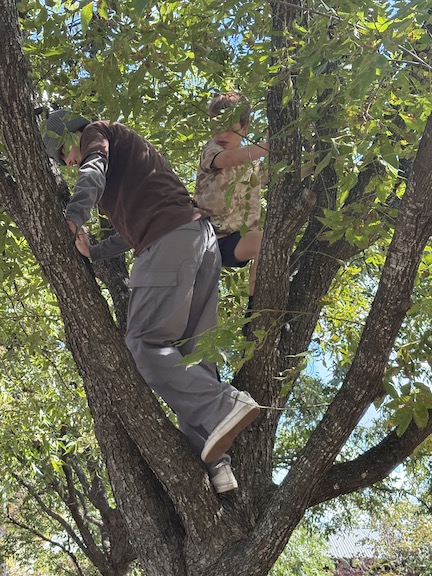This is part one of an ongoing conversation on the practice of Judicial Committees found in Sudbury school settings.
Part Two is a look at the historical and current perspectives on Sudbury JC in order to reflect and consider how to continue evolving the practice. Find Part Two here.
I have homeschooled my kids for 11 years, most of that time as a single mom while running a business from home. When my challenging work hours and lack of community made our much-loved unschooling lifestyle unsustainable, I decided to move closer to family in Austin. Finding a school that aligned with our values would give me the time to pivot my career and attend grad school while my kids continued to freely explore their passions, and the Sudbury school model–a democratically run, self-directed school–seemed like a way to maintain my children’s self-directed education (SDE) lifestyle.
Although I had read many related articles and books, I’d had minimal experience with Sudbury schools. Even the SDE-style school my oldest had once attended part-time was not quite Sudbury and still had elements of the type of authority often seen in more conventional schools. At a Sudbury school, students and staff would be on equal footing with a group effort to reach the goals and aspirations of the students.
My kids have now been attending Clearview Sudbury School for several weeks, and I already see many ways the school benefits them. As radical unschoolers, they were familiar with taking charge of their education and activities. At Clearview, they have more resources and support than I was able to provide for them, in order to see those ideas through. In this time, they’ve had the opportunity to learn and experience things like screenwriting, organizing field trips, and rescuing newborn squirrels. The friendships they’re building and support they’re receiving from staff and fellow students has been invaluable. This is the community I’d been longing for my kids to be a part of.

Sudbury schools use a process called the Judicial Committee, or JC. Daniel Greenberg, Sudbury founder, made a case for immersing students in a “judicial system” which he claimed to be central to any society. I challenge that idea. It’s no secret that our country’s judicial system is a problematic one, and is it truly central to our society? Or is it a system created to hold some people down while helping others to advance? Are we really empowering our children by having them participate in this system or is it at least as equally harmful as every other system that imposes punishments on children for infractions?
In “Beyond Discipline,” Alfie Kohn writes, “Discipline in this stunningly unconventional school is suspiciously familiar: it consists of an intricate welter of by-laws, along with a Justice Committee to enforce them by meting out punishments to those found guilty of wrongdoing. To be sure, the process here is distinctive by virtue of the fact that power rests in the hands of students. But one is led to wonder why the school is still stuck on the traditional arrangement of threats and punishments to deal with conflicts.” On this point, I have to agree with Kohn, because in just a few short weeks, I can already see the effects this process is having on my youngest.
Any change can be unsettling, and my family has certainly been through some major changes. This change, in particular, is impacting my youngest in a very specific way. It’s creating a consistent feeling of shame and making it difficult for her to really enjoy her newfound community. I do not believe that public school, in its current state, would be a better alternative. I’m unable to continue sustaining the unschooling lifestyle my children flourish in while I’m attending grad school and working. So what’s a single mom to do? For now, we are choosing to remain at the Sudbury school, and I will continue to validate my daughter’s feelings and give her a safe space to discuss her issues with the system.
While the overall model feels rigid, I understand that each Sudbury school has the autonomy and flexibility to work toward the evolution of the Judicial Committee into something that does less harm than it currently does. This is particularly important in areas where there are no other SDE center options that use less harmful approaches to similar goals. So, what would a Sudbury school without JC look like? Kohn continues, “After some reflection, I concluded that a move from “doing to” to “working with” is impossible unless there has been an effort to create and sustain relationships among the people involved. The alternative to discipline is to treat an inappropriate act as a problem to be solved together — but that is predicated on the experience of being together. With nothing more than a loosely confederated bunch of free individuals, one is left with the same old rules-and-penalties model. The pursuit of laissez-faire liberty condemns us to a system of control, even though different people may be doing the controlling.”
Whether homeschooling, unschooling, or any other choice of education model, my intent has always been to put our relationships with each other first. No method is worth damaging that. My children and I work through issues cohesively BECAUSE they trust me not to punish them. They are honest and forthcoming BECAUSE it’s emotionally safe for them to be so.
One example, from a recent incident, of the threat of punishment harming a child’s emotional development, involved my 15-year-old son climbing a tree at Clearview. His friend had challenged him to climb high enough to get onto the roof of the building, a risky endeavor, admittedly. My son became stuck too high in the tree and was nervous about not being able to get back down. Most of the school got involved and they finally got him down.
The next day, he was brought into JC and while the panel let him off with a “warning,” his action was described as “irresponsible” and he was told it may result in him not getting certified for open campus (because they couldn’t trust him to make responsible decisions). But the real consequence here is that my son may no longer trust his own decisions. By ascribing a word like “irresponsible” to his action and threatening a consequence, my son experienced a loss of self-confidence, something many teens already struggle with. The potential to learn from the scary experience and find a safer way to explore an exciting adventure while building a closer bond with the staff and other students was lost because so much focus is put on determining if an infraction has occurred and what consequences it deserves instead building relationships and learning to work together.
Collaborating with children means getting to the root of any action and understanding what about their environment or what about our process of communication needs to change so that everyone’s needs are being met. It has nothing to with punishment and everything to with connecting. We need to work with kids, not punish them. Whether the consequences are assigned by an adult authority figure or panel of their peers, the impact and potential for damage is too similar. We can and should be collectively more vocal in our valid criticism of JC. In doing so, we could inspire a deeper interrogation of this aspect of the Sudbury model that serves its community members so well in many other ways.
If you enjoyed this article and feel called to give back to ASDE, here are ways you can support our work:
- Donate money
- Share our content with others! Click one of the buttons above to easily share on Twitter, Facebook, or email.
- Consider becoming a Contributor for Tipping Points
Tipping Points Magazine amplifies the diverse voices within the Self-Directed Education movement. The views expressed in our content belong solely to the author(s). The Alliance for Self-Directed Education disclaims responsibility for any interpretation or application of the information provided. Engage in dialogue by reaching out to the author(s) directly.






